PCOS is a common endocrine condition affecting 1 in 10 women during their reproductive age.
While many women diagnosed with PCOS question their chances of becoming pregnant – the good news is – you can.
But before you start family planning, we have some important information for you to take note of and a few tips to help you on your way to achieving the dreams of motherhood.
Understanding PCOS
Before we go any further, it is important that you understand what PCOS is and the role it plays in disrupting your fertility.
PCOS is a result of hormonal imbalances within the endocrine system. These imbalances cause excessive production of testosterone while negatively affecting levels of the Follicle Stimulating Hormone (FSH) and Luteinising Hormone (LH). This imbalance results in limited egg production, disrupting a woman’s menstrual cycle and fertility.
The exact cause is unknown, but there are two possible factors.
- Genetic inheritance (from the mother).
- Disrupted signals from the brain to the ovaries affect hormone production.
PCOS symptoms
Every woman can experience a different set of symptoms, but they are commonly indicated by
- acne,
- weight gain,
- excess hair growth,
- scalp hair loss,
- fertility difficulties,
- irregular periods, and
- mental health issues such as anxiety or depression.
Possible pregnancy complications with PCOS
If you are diagnosed with PCOS, you must be aware of the possible pregnancy complications that may arise before you begin family planning.
Possible pregnancy complications with PCOS can include the following.
- Miscarriage and early pregnancy loss.
- Gestational Diabetes.
- Preeclampsia (sudden increase in blood pressure after 20 weeks).
- High blood pressure induced by pregnancy.
- Preterm birth (baby born before 37 weeks).
- Caesarean (C-section) delivery due to complications associated with PCOS.
Rest assured, Dr Kothari will discuss the potential scenarios in detail, provide you with information and answer any questions you may have.
Boost your chances of a natural pregnancy with PCOS.
Now that you are equipped with essential information about PCOS and the possible pregnancy complications you need to be aware of, here are a few lifestyle changes you can make, as recommended by the international evidence-based guideline for the assessment and management of polycystic ovary syndrome, to improve your chances of natural conception.
- Lifestyle changes (no smoking/reduced alcohol intake).
- Eating a healthy diet.
- Regular, moderate exercise.
- Plenty of sleep.
- Looking after your emotional well-being.
- Improving the quality of life.
Medical treatment options
Sometimes you might need a little extra help. In this case, your doctor may prescribe clomiphene citrate or follicle-stimulating hormone (FSH) injections for ovulation induction. Alternatively, depending on your circumstances, they may recommend IVF.
Seeking medical advice and support
Before making any drastic lifestyle changes, we highly recommend you seek medical advice. Therefore, if you are diagnosed with PCOS and are family planning, you are advised to come in for a preconception check-up. The preconception check-up will allow Dr Kothari to identify any underlying conditions that may hinder your chances of getting pregnant and give you the opportunity to discuss any concerns you may have.
If you are family planning and have PCOS, call 02 4225 1999 to book your preconception health check.
Dr Kothari will take the time to listen to and understand your concerns. After careful observation and diagnosis, he will provide you with a tailored treatment to suit your circumstances and will guide you and support you throughout your journey.

